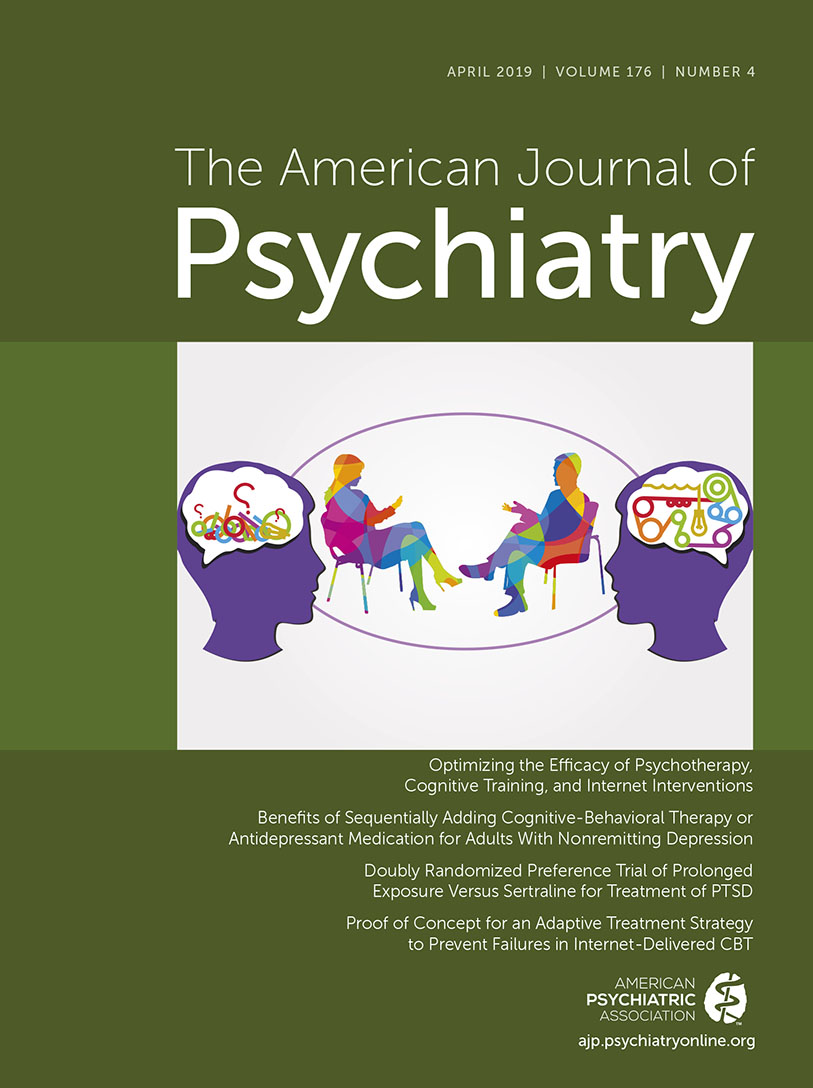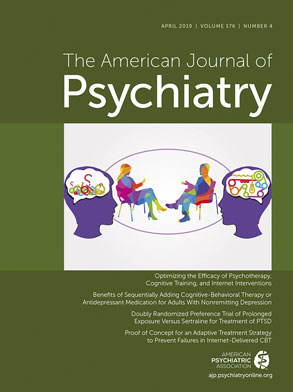In this issue, McClure and colleagues publish new and important findings on the pharmacological augmentation of cognitive remediation and skills training with guanfacine (
1), an alpha
2a-adrenergic agonist with some promise to improve cognition in schizophrenia spectrum disorders. In a randomized controlled trial, the effects of adding guanfacine (compared with placebo) to an abbreviated version of cognitive enhancement therapy were evaluated in people with schizotypal personality disorder. Cognitive enhancement therapy is a psychosocial treatment program that includes both cognitive remediation and social cognition and skills training (
2,
3). Cognitive remediation targets cognitive functioning through a combination of “drill-and-practice” computer-based cognitive exercises and strategy coaching to improve cognitive performance. Social cognition training targets social cue recognition (e.g., facial expressions) and accurate social inferences (e.g., perceiving the other person’s perspective) through group-based practice, whereas social skills training targets social functioning and independent living through social learning methods (e.g., modeling, role playing, and in vivo practice of skills).
After 8 weeks of 4 hours per week of the abbreviated cognitive enhancement therapy, participants in both groups improved on cognitive measures (as assessed by the Measurement and Treatment Research to Improve Cognition in Schizophrenia Consensus Cognitive Battery) of speed of processing and visual and verbal memory, but only those who received guanfacine also demonstrated significant improvements in reasoning and problem solving, social cognition (as assessed by the Movie for the Assessment of Social Cognition), and functional skills (as measured by the University of California San Diego Performance-Based Skills Assessment; UPSA). The results suggest that guanfacine enhanced the effects of cognitive remediation and skills training on cognitive and functional skills, which has potentially important implications for improving the effectiveness of treatments for individuals with schizophrenia spectrum disorders.
Two previous small controlled trials of guanfacine have suggested modest effects for improving cognition in individuals with schizophrenia spectrum disorders (
4–
6), but most research of putative pharmacological cognitive enhancers in schizophrenia has found limited effects on improving cognitive performance (
7). Adding interventions that involve learning, such as psychosocial rehabilitation, have been hypothesized to augment the effects of interventions that target cognition, such as cognitive remediation. Two meta-analyses have shown that providing cognitive remediation with integrated or adjunctive psychosocial rehabilitation, such as social skills training or supported employment, results in significantly greater gains in psychosocial outcomes than when either cognitive remediation or psychosocial rehabilitation is provided alone (
8,
9). The active learning demands involved in psychosocial rehabilitation programs appear to potentiate the effects of cognitive remediation on psychosocial gains, although, interestingly, these combined interventions do not lead to greater improvements in cognitive functioning than cognitive remediation alone.
Studies attempting to augment the effects of cognitive remediation by adding a variety of putative cognitive enhancers have not yielded promising results thus far (
10–
13). Until the study by McClure et al., however, guanfacine had not been tested in a cognitive remediation paradigm. The study is unique in evaluating effects of guanfacine when added to a multipronged intervention including both cognitive remediation and social cognition and social skills training. The promising results suggest that the provision of multiple types of learning experiences in the context of treatment, such as practicing and honing performance on cognitive exercises, learning how to differentiate social cues, and role playing and in vivo practice of interpersonal skills, may result in greater opportunities for the effects of guanfacine to have a measurable impact on both cognition and psychosocial functioning. Most exciting of all, the findings suggest that guanfacine may potentiate the effects of psychosocial rehabilitation programs, especially when combined with cognitive remediation. Substantial progress has been made in recent years in the development and validation of empirically supported psychosocial interventions for improving functional outcomes in people with schizophrenia, but the pace of improvement is slow and the overall magnitude of the gains in functioning is modest (
14). The findings of this study offer preliminary hope that pharmacological agents that enhance cognitive functioning, such as guanfacine, may have a role in fostering the long process of recovery from schizophrenia.
It should be noted that the abbreviated cognitive enhancement therapy used in the McClure et al. study was more akin to a psychosocial treatment probe than a full-fledged psychosocial program. Cognitive enhancement therapy has a growing track record of demonstrated effectiveness for improving cognitive and psychosocial outcomes in schizophrenia spectrum disorders, but the program generally takes 9–24 months to deliver, much longer than the 8 weeks of the abbreviated program studied by McClure et al. An additional caveat is that this study evaluated the effects of adding guanfacine to the abbreviated cognitive enhancement therapy on functional skills (as assessed by the UPSA), but not on psychosocial functioning proper. While functional skills performance may serve as a proxy for psychosocial functioning, it is not a direct measure of social and community functioning per se, which is the primary outcome of interest. Nevertheless, this study presents an important and encouraging finding. The results raise the possibility that providing guanfacine in the context of a longer-term comprehensive program that provides both cognitive remediation and psychosocial rehabilitation, such as cognitive enhancement therapy or the Thinking Skills for Work program integrated with supported employment (
15), could result in even greater gains in psychosocial functioning, could accelerate the pace of learning, allowing gains to be made over briefer periods of time, or both.

